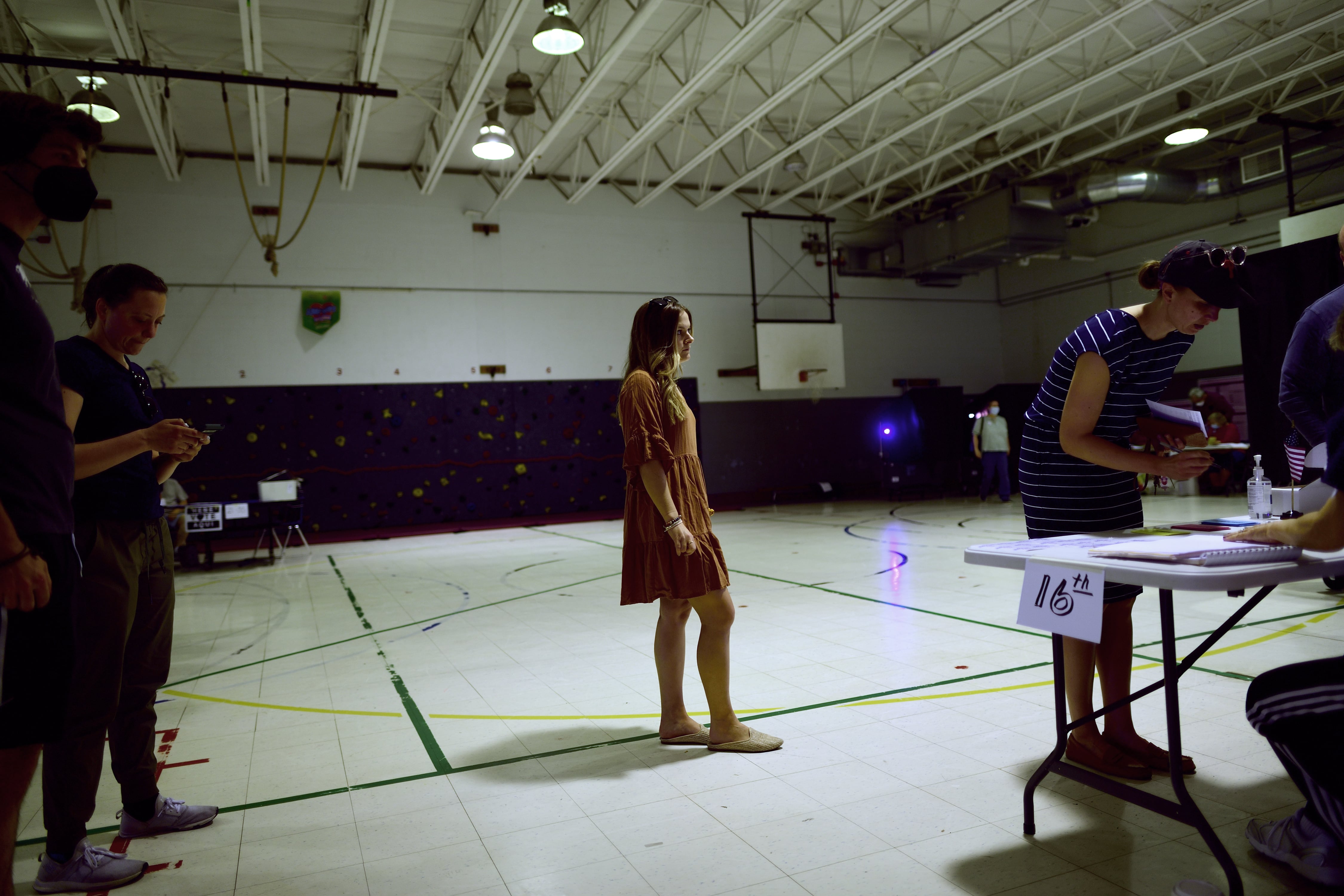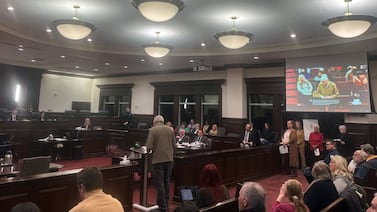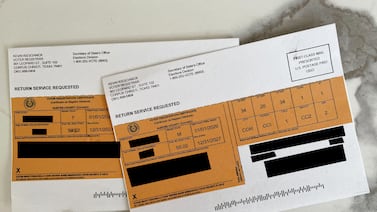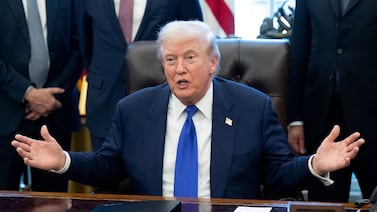A version of this post was originally distributed in Votebeat’s weekly newsletter. Sign up here.
Less than a week before New Jersey’s June 7 primary, students and staff at schools around the state slated to serve as polling places got some late-breaking news: School would be remote that day.
The New Jersey primary date was only two weeks after the mass shooting of students in Uvalde, Texas, heightened concerns about school security across the country.
“After the shooting in Uvalde, parent anxiety was very high,” said Richard Bozza, executive director of the New Jersey Association of School Administrators. In response, New Jersey Gov. Phil Murphy allowed districts to choose virtual learning for schools hosting polling sites.
The concerns aren’t confined to New Jersey: Thousands of public school buildings around the country serve as polling places. School buildings tend to be conveniently located, accessible for disabled voters, and typically have large spaces such as cafeterias and gymnasiums. In many states, including Texas, Michigan, and Arizona, state law requires public buildings, including schools, to be made available for use during elections.
Nonetheless, there’s been a “slow trend” away from using schools for voting when children are present, according to the National Conference of State Legislatures, which notes four states — Delaware, Rhode Island, Montana, and Tennessee — require schools to be closed when used as polling places.
Local election and school officials acknowledge that the public’s intensified anxieties over school security coexists uneasily with opening the buildings up for voting. Some New Jersey state lawmakers are now sponsoring a bill that would allow police to be present at schools and senior centers serving as polling places, something that currently isn’t permitted. Still, in many places, there are few good alternative polling sites, leaving local officials in a conundrum of deciding who gets the use of school buildings during an election — students or voters.
In his message to the community announcing plans for remote schooling, Hamilton Township Superintendent Scott Rocco nodded to the tension, saying he and his staff “have tried to move the elections out of our schools for security reasons,” something Bozza said the New Jersey school administrators’ association has also lobbied for. “At the same time,” Rocco wrote, “we understand that our community needs accessible voting locations that are within a specific distance of their homes.”
The various directions the debates are taking locally reveal that there is little consensus and no easy answers.
In Washington, D.C., local election officials are reconsidering whether to use schools as early voting sites for the November election. In Wake County, N.C., parents are asking the school system to make Election Day a teacher workday so students aren’t in the building.
In Texas, months before the Uvalde shooting, the Texas Association of School Boards issued guidance to school districts informing them they couldn’t prohibit the use of district buildings as polling places but should “strategically locate polling places on school property to minimize interaction between voters and students.” More than 2,000 schools in the Lone Star state served as polling locations for the March 2022 primary, according to data provided by the Texas secretary of state’s office.
That includes roughly half the polling sites in Harris County, which includes Houston. Leah Shah, Harris County elections division’s director of communication and voter outreach, said that since the massacre in Uvalde, the county’s elections division has received a couple of emails from concerned voters and election workers about the use of schools, in addition to what Shah described as a “small number of requests” over the years.
“Alternatively, we have also received requests to maintain use of schools as locations to ensure equitable voter access, especially in areas where community centers are not closely available,” Shah said.
In Pennsylvania, Mark Walters, a spokesperson for the secretary of state’s office, said that “some schools have asked county boards of elections to find alternate polling locations over student safety concerns,” and the County Commissioners Association of Pennsylvania recommends making Election Day a teacher workday.
In Michigan, Tracy Wimmer, the spokeswoman for Secretary of State Jocelyn Benson, said her office is “not aware of any school districts that have expressed hesitancy as polling locations this year.”
And in Maricopa County, Arizona’s most populous county, “we found many more challenges in 2020 when schools were closing because of the pandemic and we needed to find spaces large enough to allow for physical distancing. This cycle, we have polling locations on more school campuses than in 2020,” said Megan Gilbertson, a spokeswoman for Maricopa County elections.
In New Jersey, Bozza is hoping for a permanent solution.
“We’ve tried to get legislation to move the polls out, but now if that’s not feasible, what we’re trying to do is allow schools to have a virtual day of learning,” he said.
Votebeat reporters Oralandar Brand-Williams, Denise Clay-Murray, Natalia Contreras, and freelance reporter Rachel Leingang contributed to this article.
Back Then
Schools and voting have a long, odd history together. Several states allowed women to vote in elections related to schools well before the 19th Amendment. It all started in 1838 when Kentucky enfranchised women for these elections, so long as they were widows or unmarried women who owned property and were subject to school taxation. From 1855 to 1910, a total of 27 states and territories followed suit, with New Mexico as the last to do so. Mississippi in 1880 specifically restricted this already-limited franchise to women who were the “head” of the family. Kentucky changed its requirement in 1893 to give widows or unmarried mothers of children in school the right, and in 1912 broadened the law to include all “literate” women.
New from Votebeat
- Arizona lawmakers considered more than 100 election-related bills to address perceived election problems based on unsupported allegations of wrongdoing emanating from last year’s Senate-led review of Maricopa’s 2020 election and former President Trump’s stolen-election claims. Ahead of the August primary, Rachel Leingang reports for Votebeat Arizona on what has and hasn’t changed.
- The Republican National Committee is telling potential Arizona polling place observers that there are “festering problems” in how elections are run as it trains them for the state’s upcoming primary election. Votebeat Arizona’s Jen Fifield went inside RNC trainings for an inside look, and talked to election administrators about how they make changes to protect against potential disruptions from poll observers and poll workers.
- In Pennsylvania, GOP gubernatorial candidate Doug Mastriano wants to require all voters to re-register, something that isn’t permitted under federal law. The state already has safeguards in place to ensure clean voter rolls, Denise Clay-Murray reports for Votebeat Pennsylvania.
- Votebeat Texas reporter Natalia Contreras is one of many immigrants who cannot vote in U.S. elections. She wants her reporting for Votebeat Texas to help underrepresented communities in Texas understand how the system works.
In Other Voting News
- Voting rights activists are alarmed at the U.S. Supreme Court’s decision to hear a case that revolves around a legal theory giving state legislatures total control over federal elections. Known as the “independent state legislature theory,” it argues that state courts have no authority to review state legislative decisions on elections, creating an opportunity for state lawmakers to change the rules for partisan purposes. FiveThirtyEight looks at the potential consequences.
- In a 4–3 decision, the Wisconsin Supreme Court ruled that absentee ballot dropboxes are illegal in the state outside of election clerk offices, and only legislators can change that, the Milwaukee Journal Sentinel reports.
- Men affiliated with a nonprofit with close ties to Republicans knocked on doors in the predominantly Black community of Sunnyside, Texas, and asked residents to sign affidavits verifying information about registered voters, the Houston Chronicle reported. County officials said the organization is not affiliated with the state, and residents are not required to provide information. The Harris County attorney’s office is investigating.
- Harris County, Texas, chose as its new elections administrator Clifford Tatum, a former executive director of the District of Columbia Board of Elections and a former general counsel for the U.S. Elections Assistance Commission. Former Elections Administrator Isabel Longoria resigned after a troubled March primary. A new report commissioned by the county highlights election administration improvements the county could make.
- Candidates around the country this year have repeatedly made vague claims of fraud this year, suggesting they won elections that in fact were not close. Experts say former President Donald Trump’s fundraising success shows how candidates can benefit from such claims, even with little or no evidence to support them.
- The U.S. Department of Justice is suing Arizona over a new law requiring proof of citizenship to vote in federal elections, saying the state cannot demand such evidence from voters who register using a federal form.
- In the latest example of longtime elections officials leaving in the face of threats and harassment, Arizona’s Yavapai County Recorder Leslie Hoffman and elections director Lynn Constabile have resigned, citing threats and “nastiness” in the wake of the 2020 presidential election.
- An NPR investigation found so-called election conspiracy influencers have hosted hundreds of community events around the country to promote their theories directly to attendees at local events.
- Government Technology takes a deep look at the move toward ballot-marking devices and voting systems that produce voter-verified paper audit trails.
- Key members of former President Donald Trump’s legal team, including Rudy Giuliani and Cleta Mitchell, have been subpoenaed by a grand jury in Fulton County, Georgia, in connection with an investigation into potential criminal interference in the 2020 election, according to the Atlanta Journal-Constitution.
- A group of election law experts have launched the “Safeguarding Democracy Project” at UCLA Law, designed to promote “research, collaboration and advocacy aimed at ensuring continued free and fair elections in the United States.” Politico wrote about the new effort.
Good News of the Week
By Christian McCann, Votebeat intern
The Wisconsin Elections Commission is sending out postcards to roughly 200,000 eligible, but not yet registered, voters. The postcards tell voters how to register, give a number for a helpline, and are a required part of Wisconsin’s membership with the Electronic Registration Information Center. The number of postcards sent out every two years has been shrinking, which suggests the postcards are helping encourage eligible voters to register.
Carrie Levine is Votebeat’s story editor and is based in Washington, D.C. Contact Carrie at clevine@votebeat.org.




